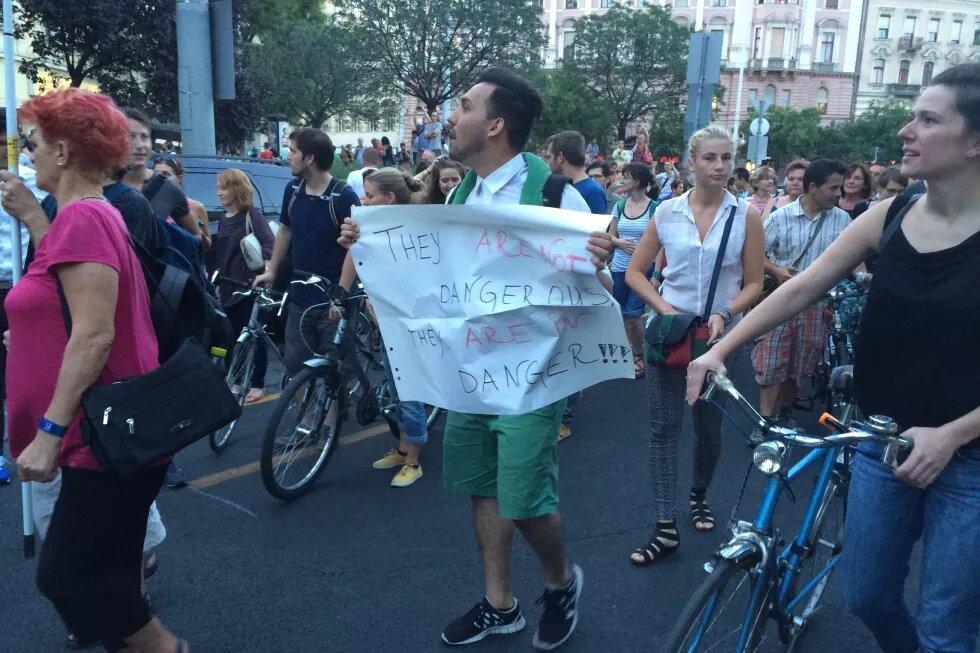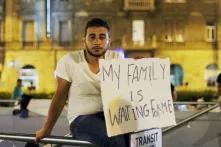
From my hotel room in Budapest at the weekend, I followed the images of Germany’s Willkommenskultur, the country’s policy and manner of welcoming refugees and migrants. Refugees who a few hours earlier did not know what would happen next were received warmly. I am pleased that these people no longer have to persevere in Budapest’s Keleti railway station or at the processing centres in Bicske and Röszke – they have now been granted permission to travel via Austria to Germany.
Many people have become involved in helping the refugees – not only in Germany, but in Hungary as well. This engagement has foundered in recent days due to the chaotic conditions which have ensued and for which the Hungarian government is to blame, but people have been helping and are continuing to help nonetheless. This deserves recognition and must not be concealed.
Last week, demonstrators repeatedly filled the streets to protest the government’s refugee and migration policies in front of the Hungarian Parliament Building with the message “Not in my name”. A few held signs with slogans such as “They are not dangerous; they are in danger”, “I was a refugee in 1956” and “We were migrants too”. Even though only a few thousand protesters turned out, this is nevertheless worth mentioning, although unfortunately the protests received little coverage in the international media.
The Facebook group Migration Aid organised the distribution of drinks, food, clothing, blankets, tents and medicaments, and volunteers helped out around the clock where they could at Budapest’s Keleti and Nyugati railway stations. Children were brought paper, pencils and toys, and students played with the children and young adults. Civic initiatives made their premises available, and the sick were and are being cared for there. I do not want to name these initiatives and organisations in this article, as this could jeopardise their future engagement.
Then, last Friday, several new laws were rushed through Hungary’s National Assembly and are expected to enter into force in mid-September following the declaration of an “immigration emergency”. Under the new legislation, it will only be possible for refugees and migrants to enter Hungary across the Serbian border at special registration centres where all asylum requests must be submitted, the processing of which has been significantly accelerated. Anyone who crosses the border elsewhere or damages border fortifications will be committing a crime. Rejected asylum seekers and persons “without prospects or the right to stay” will be expelled immediately at the border. The army can “if required take physical measures to protect the border”. The new laws also stipulate that all persons who provide shelter to “illegal interlopers” or provide “assistance crossing the border” will be subject to up to four years’ imprisonment, and police will have the authority to search apartments and private property on the basis of “suspicious activity” even without a search warrant. It is clear that this is intended to scare off more than just gangs of human traffickers.
I met many people in Budapest who want to continue to help despite these intimidation tactics by the government. I marvel at their civic courage, patience and resilience—their efforts to create a counter-public in Hungary.
On Monday morning, I take the train back to Prague. Keleti railway station is almost empty. The loudspeaker announces that only passengers with a valid ticket and reservation may board the train to Berlin. There is a police cordon in front of the track, and a line has formed of people who are not being let through. It soon becomes clear that racial profiling is at work here. The policeman waives me through without checking my ticket. Before I board the train, I see a woman trying to intercede in Hungarian between the police and the people waiting in the line. I am grateful to her.
English translation: Evan Mellander
















